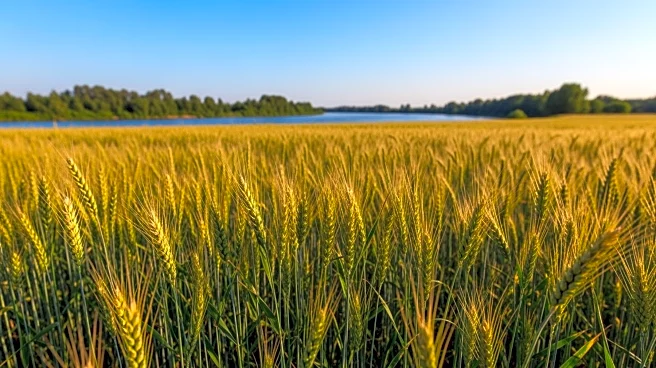What's Happening?
The Federal Committee on Agriculture (FCA) has set a wheat production target of 30 million tonnes for the Rabi season 2025-26, relying on adequate water availability in Punjab and Sindh, the primary wheat-producing
provinces. This target follows the previous season's achievement of 28.42 million tonnes, surpassing the initial goal of 27.92 million tonnes. The FCA meeting, presided over by Minister for National Food Security and Research Rana Tanveer Hussain, also finalized a wheat policy to ensure fair support prices for farmers. The policy aims to cover production costs and provide reasonable profit margins. The committee recommended early wheat sowing, quality seed availability, affordable fertiliser supply, and the use of herbicides. Additionally, it emphasized the dissemination of production technology, access to agricultural credit, and the cultivation of barren wastelands through corporate farming. Other Rabi crop targets include 393,000 tonnes for gram, 8.916 million tonnes for potato, 2.788 million tonnes for onion, and 659,000 tonnes for tomato.
Why It's Important?
The setting of a 30 million tonne wheat production target is crucial for ensuring food security and self-sufficiency in staple food commodities in Pakistan. Adequate water availability in Punjab and Sindh is expected to support this ambitious goal, which is vital for the agricultural sector's stability and growth. The policy measures, including fair support prices and improved seed varieties, aim to protect farmers' interests and enhance productivity. The emphasis on climate-smart agriculture and innovative technologies reflects a proactive approach to addressing climate change impacts and optimizing resource use. The government's commitment to increasing agricultural credit flow, as evidenced by the State Bank of Pakistan's target of Rs2.572 trillion for fiscal year 2025, underscores the importance of financial support in achieving these production goals.
What's Next?
The FCA's recommendations for early wheat sowing and the use of improved seed varieties are expected to be implemented in the coming months. The focus on climate-smart agriculture and innovative technologies will likely lead to increased research and development efforts. The government is expected to continue coordinating federal and provincial efforts to ensure food security and support farmers. The anticipated stable supply of urea and DAP fertilisers will play a crucial role in achieving the production targets. The success of these initiatives will depend on timely policy implementation, improved irrigation management, and mechanization. The agricultural sector's progress will be closely monitored, with potential adjustments to strategies based on weather patterns and resource availability.
Beyond the Headlines
The FCA's focus on climate-smart agriculture and innovative technologies highlights the long-term shift towards sustainable agricultural practices. The emphasis on drought-tolerant and rust-resistant wheat varieties reflects an adaptation to climate change challenges. The use of technologies developed by Suparco and the Land Information and Management System for production forecasting indicates a move towards data-driven decision-making in agriculture. The government's efforts to enhance agricultural credit flow and support farmers' prosperity underscore the sector's role as a backbone of the country's progress. These developments may lead to increased investment in research and development, fostering innovation and resilience in the agricultural sector.










